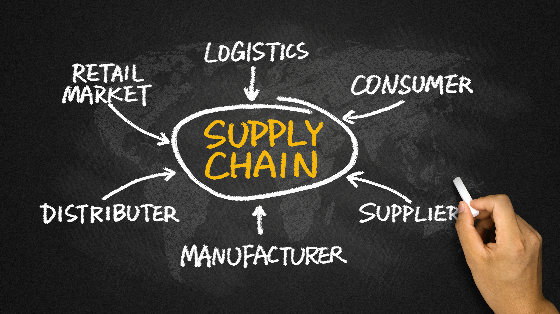The International Trade Blog Import Procedures
Tips to Build a Reliable Supply Chain and Improve Visibility
On: June 23, 2021 | By:  Dr. Cheryl McCloud |
3 min. read
Dr. Cheryl McCloud |
3 min. read
 Supply chain managers working for small- and medium-sized enterprises (SMEs) must take their alignment and collaboration with partners seriously. Technology is going to play a critical role in future logistics, and organizations without visibility (being able to see what is happening at all stages in the supply chain) are not going to be positioned for success.
Supply chain managers working for small- and medium-sized enterprises (SMEs) must take their alignment and collaboration with partners seriously. Technology is going to play a critical role in future logistics, and organizations without visibility (being able to see what is happening at all stages in the supply chain) are not going to be positioned for success.
Visibility in supply chain management is critical because the process is often complex, involving multiple tiers and materials coming from multiple origins. Shipping needs to be tracked to manufacturing sites and then ultimately to the consumer. Visibility also provides insight for many areas of your company: sales, marketing, distribution and contracting. When disruptions occur and quick decisions must be made, knowing what is available and where can seriously impact your bottom line.
Technology is a window into every step of the supply chain and key to growth and gaining a competitive market advantage. It ensures the tracking of vendors, ingredients and shipping and can help you identify issues or risks and what strategic changes can be made to avoid delays. Supply chain issues impact your company’s cash flow and can potentially cost you sales.
Creating a Reliable Supply Chain
Small businesses looking for a competitive advantage should focus on creating reliable services and having plans in place to quickly recover from supply chain disruptions. Proactive, advanced initiatives can set organizations apart as industry leaders. Organizations that do not plan ahead end up reacting to global disruptions—decisions are delayed due to lack of visibility. Ultimately they end up with costs and losses that impact the entire organization and its reputation.
Management should oversee security to help their companies avoid exposure to risk, and they should be actively involved in learning and training to enhance employee skills and knowledge. Advanced initiatives should focus on developing products that will increase revenue, enhance cash flow, provide added working capital for growth, and increase service and customer levels.
Consider these initiatives for supply chain management success:
1. Strategic Planning
Integrate processes and strategic development by coordinating the efforts of all of your supply chain partners. By building trust and collaborative relationships with partners, you ensure information-sharing and other benefits that will improve services and lower costs.
2. Evaluate What’s Working
Mapping the full supply chain process provides added insight into how partners are performing and should become the foundation for annual reviews that cover everything from procurement and material processing to production, delivery, materials, modes of shipping and handling, and regulatory compliance. Marketing, sales, manufacturing and logistics are critical to the annual review process.
3. Price Control
Understanding your company’s raw material sourcing and collaborating with partners to lower costs is critical to control prices and stay competitive. An expanding global market and changing trade agreements will continue to impact manufacturing locations and distribution points as you consider expansion.
4. Communication with Partners
Throughout the entire supply-chain process, work with your partners to collect data. Normal data—volumes, weights, origins and trade lanes—is helpful, but including data such as wastes, repairs, asset maintenance and scheduled downtime is also important. This data provides insight into cost reduction, customer satisfaction and traceability and is important for strategic planning. Follow up and communicate with your internal and external partners along the way. Good collaboration and communication will help you avoid costly disruptions. Having the right technology in place to collect data along the way will also help to ensure you are meeting your contractual obligations.
5. Acquisitions and Expansion
For smaller companies looking to expand, the acquisition of end-to-end systems can be key to growth, vendor expansion, partnership development and sustainability.
Partners, products, markets and service levels are continuously changing, so regular review of each of these initiatives is important for continued growth and profitability.
Leadership Strategies
Additionally, leaders of SMEs should:
- Invest in education and training.;
- Prioritize knowledge sharing. Collaboration internally and externally drives goals, promotes friendly cultures, and inspires individuals to solve problems and create market-leading solutions. Leadership should ensure the right information flows to the right employees and partners.
- Develop strategies that are flexible and allow your company to react quickly. Supply chain disruptions related to COVID-19 presented massive logistic challenges. Flexibility and supply chain management was tested and in many cases proved to be fragile as equipment, parts and supplies became unavailable. As we look to the future, having trained employees, mapped processes, technology, solid partners and flexible strategies will help companies prepare for global challenges.
- Expand partnerships in supply chain management channels, from production and manufacturing to logistics.
- Develop human resources to ensure the best person is hired for every position.
These objectives are critical to organizational success. Leadership strategies that create trust for long-term relationship development and extend technology and oversight are critical to ensure success, profitability and growth.
Like what you read? Subscribe today to the International Trade Blog to get the latest news and tips for exporters and importers delivered to your inbox.

About the Author: Dr. Cheryl McCloud
Dr. Cheryl McCloud has more than 30 years of experience in global supply chain management and the added distinction of receiving a DBA from Walden University with a specialization in Global Supply Chain Management. As a licensed U.S. Customs Broker and Freight Forwarder, Cheryl owned her international freight forwarding, customs brokerage, distribution, and federal contracting business, providing many services to importers, exporters and the U.S. Federal Government, becoming a 500 Inc. company.
Now, Cheryl is focused on helping small businesses understand the supply chain and regulatory compliance requirements to avoid unwanted risks and financial costs, creating strong profitability. Cheryl has additionally supported the development of new supply chain management programs in local colleges as a professor and currently the Chair of the Education Committee for the International Propeller Club headquarters in the U.S. and has a prodigious interest in the promotion of education, labor growth and opportunities for the maritime business.


